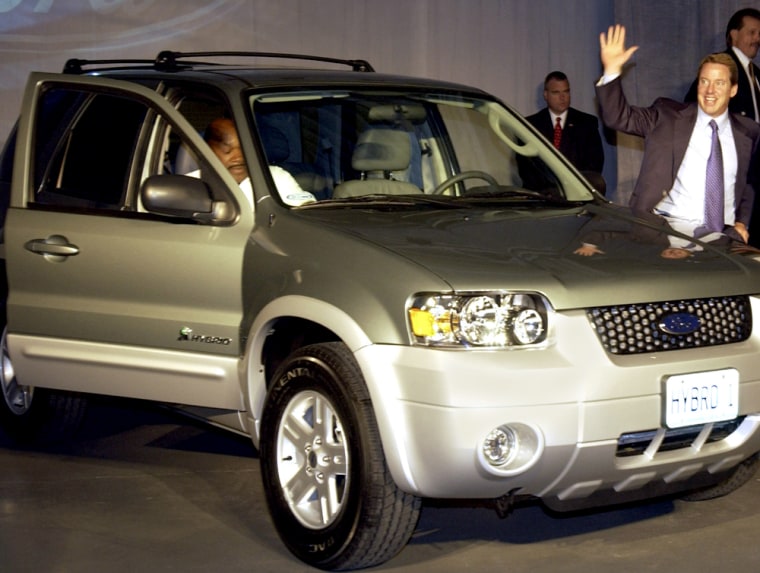Ford Motor Co. on Thursday rolled out the first hybrid SUVs headed for showrooms, touting the gas-electric technology that nearly doubles city driving mileage to 36 mpg. Environmentalists welcomed the hybrid Escape, but some also noted that Ford still has the worst overall fuel economy among top carmakers.
Ford celebrated the rollout of the world's first consumer-ready hybrid SUV at its Escape assembly plant in Kansas City, Mo.
"Escape Hybrid is our first production vehicle aimed at mainstream customers powered by anything other than an internal combustion engine," CEO Bill Ford said in a statement.
"It's the first, but it won't be the last," he added, promising that "we're going to be leaders in automotive technology that makes a difference for our customers and the world they live in."
Hybrids can dramatically improve mileage by incorporating an electric motor that assists a gasoline engine. The motor is powered by energy captured from braking as well as from the gas engine itself.
The EPA this week certified the 2005 Escape Hybrid at 36 mpg city/31 mpg highway — "the highest fuel economy numbers ever certified for an SUV," Ford noted. The higher mileage also means dramatically reduced emissions of pollutants and carbon dioxide, a gas tied to global warming.
Available in September, the Escape Hybrid is expected to cost around $3,300 more than the conventional version, about $27,000 for the two-wheel-drive model and $28,600 for the four-wheel-drive model.
The Sierra Club welcomed the Escape Hybrid in a statement of its own. “The hybrid Escape is a rolling advertisement for better technology and a cleaner environment,” said David Hamilton, director of the group's global warming and energy program.
Like other environmentalists, he noted that Ford initially plans on building just 20,000 hybrid Escapes a year — a blip in Ford’s total annual vehicle production.
“We look forward to helping build demand for these vehicles and encourage Ford to put this gas-saving technology to work on all their vehicles" so that it can "go from worst to first ... for fleet fuel economy,” Hamilton said.
Ford compared to ‘alcoholic’
A coalition of other environmental groups was a bit more critical, welcoming the Escape hybrid but noting that Ford's fleet of cars and trucks averages 18.8 miles per gallon, the lowest fleet average of any major carmaker.
"Their overall fuel economy is so low, it’s actually worse than the fleet average from 25 years ago," said Gretchen DuBeau of U.S. PIRG.
“We applaud Ford’s effort to increase the fuel economy of the Escape, but we are concerned that Ford is systematically working behind the scenes to undermine the entire fuel economy system,” DuBeau added, noting that:
- Ford last year withdrew a promise to increase the fuel economy of its SUV fleet by 25 percent.
- Ford supports a loophole that permits pickup trucks, SUVs and minivans to meet lower fuel economy standards.
Jennifer Krill of the Rainforest Action Network branded Ford “a public danger” because of its “oil addiction.”
“We liken Ford’s hybrid Escape release to an alcoholic going from 20 drinks a day to 19 drinks a day,” Krill said. "Ford cannot escape its oil dependence with a few thousand hybrid SUVs.”
Company's response
Ford spokeswoman Kristen Kinley countered that the second-largest U.S. automaker was “aggressively pursuing” better fuel economy.
“We feel that the hybrid Escape is one very strong example of that,” she said.
Ford, which is planning at least two other hybrid models, has also let it be known that its committment extends to a financial investment since it will initially sell the hybrid Escape at a loss because of high development costs.
Honda, Toyota lead field
Japanese carmakers Honda and Toyota lead the hybrid market, with the former being the first to sell gas-electrics and the latter announcing plans to expand rapidly.
Toyota President Fujio Cho told reporters at an auto conference in northern Michigan Wednesday that the company hopes to sell 300,000 hybrid vehicles next year.
“It may be difficult for us to produce (300,000) hybrids by that time, but we have another year to go so we’ll make every effort,” Cho told reporters.
Toyota sold 53,293 hybrid vehicles worldwide in 2003 and announced Tuesday it was boosting monthly production of its hybrid sedan, the Prius, from 10,000 to 15,000 a month in 2005 to meet global demand.
Toyota also plans to introduce two hybrid sport utility vehicles early next year — the Toyota Highlander and Lexus RX400H.
Cho acknowledged that a possible obstacle to reaching 300,000 hybrid sales is capacity. For now, all production takes place in Japan, but Cho said the company was studying the possibility of building hybrids in the United States.
“Sometime in the future we might have to consider doing that,” he said. “We’re carrying out various studies at the moment about various possibilities, but it’s still at the stage of studying matters.”
Honda, for its part, is set to introduce a hybrid version of its popular Accord sedan this fall.
U.S. registrations for hybrid vehicles rose to 43,435 last year, a 25.8 percent increase from 2002, according to recent figures from R.L. Polk & Co.
Since 2000, hybrid sales in the United States have grown at an average annual rate of 88.6 percent, Polk said, but they account for only a fraction of total vehicles sold. Full-year U.S. sales for 2003 were 16.7 million.
